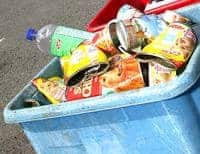The call from Councillor Paul Bettison came as the association revealed that more than a quarter of local authorities are storing material because of the fall in prices and 23% are looking at alternative options to recycling.
At the same time the association, which represents 466 authorities in England and Wales, warned that more end-of-life vehicles may be abandoned on streets and that for recyclables without markets, composting and then energy-from-waste should be seen as alternative routes ahead of landfill, should the need arise. And, it suggested that military buildings may be an option for storage of some material.

If people don't keep recycling it will result in increased disposal costs for council tax payers.
Councillor Paul Bettison, Environment Chairman, Local Government Association
Ministerial meeting
The detailed advice from the LGA comes after the fall in the value of recycled materials caused by the global economic downturn and will be followed up this week by a meeting between Councillor Bettison and Defra ministers including environment minister Jane Kennedy.
The LGA has today written to council leaders to set out the key ways in which it believes local authorities can tackle the problem caused by what it calls “the dramatic fall in demand”. And it notes that while many councils have agreed fixed price contracts for recyclable materials with private companies and are not currently affected by the market prices, there are some “whose recycling firms are now refusing to take recycled material because of the collapse in market prices”.
Suggestions
For councils who are facing difficulties in finding outlets for materials, the LGA suggests:
-
Utilising the expert advice of industry experts and government advisers to access new buyers
-
Short term storage until market prices rise. The Environment Agency has already committed to respond quickly to requests for temporary increases in storage capacity at sites already permitted to accept those wastes.
-
Longer term storage in other facilities where it makes sense. In the event of markets not recovering in the medium term, the LGA will press the Environment Agency to look at storage facilities – e.g. ex-military buildings – to avoid increased costs for councils.
-
Where long-term storage is impractical, councils should increase the composting of biodegradable materials.
-
The Government should return the proceeds of landfill tax – £1.5bn over three years – to councils so the money can be invested in recycling facilities that will produce higher quality , more marketable materials
Survey of market impact
A snapshot survey conducted by the LGA has revealed that the impact of the drop in demand for recycled materials was having a mixed impact across the country. Of the councils which responded, it found:
-
25% are not currently experiencing problems because they have fixed rate contracts
-
75% reported falling prices
-
27% have increased the temporary storage of materials within existing capacity
-
23% are considering alternative disposal options if the situation does not improve
Cllr Bettison said: “Local government is operating under challenging financial circumstances, but councils must take all reasonable action to maintain recycling services for local people. The fall in prices will not last forever, and material not put out for recycling will go to landfill sites. If people don't keep recycling it will result in increased disposal costs for council tax payers.
“It is vital that people continue to recycle as much as possible. Should councils be unable to secure buyers for recyclable material, short-term storage should be explored as the most sensible option. The Environment Agency has issued guidance on the storage of recyclable material, and is committed to responding quickly to requests for temporary increases in storage capacity for recyclable waste at sites already permitted to accept it. Should this prove insufficient, the LGA will press them to quickly permit appropriate new sites.”
Alternatives to recycling
Cllr Bettison added: “The waste prevention message must always come first. When looking at alternatives to recycling, composting or incineration should be considered. The use of landfill must be an absolute last resort.
“Prices can fluctuate significantly and consequently it is too early to speculate on what the impact may be on council finances. What the uncertainty does confirm is the need for the Government to make good its pledge to return the proceeds from landfill tax to local authorities so this money can be invested in local recycling facilities. Producing high quality materials provides the best opportunity for them to be sold at the best price.”
The full copy of the letter from Cllr Bettison to council leaders is reproduced below:
Dear Leader,
Recyclate Material Markets
-
Many of you will have seen recent reports in the media about the falling prices for some recyclable materials. LGA officials wrote out through officer networks last week to gauge how this is affecting Local Authorities. The effects are different depending on the nature of our contractual arrangements, but lower prices and a struggle to find buyers for material are being reported.
-
I know many of you will have fixed price contracts in place for your recyclates and this letter will be of less relevance to you. But I hope you will forgive me for writing out to all councils in the knowledge that we do not hold a record of each individual arrangement.
-
Whilst I recognise that we are all operating under challenging financial circumstances, councils should explore all reasonable options for maintaining recycling services for our residents. These low prices will not last forever. Recycling is good for the environment. Material not put out for recycling will go to landfill, and the disposal costs, including landfill tax will fall on council tax payers. So it is vital that people continue to use their recycling service and to recycle as many things as possible.
-
Where councils are struggling to find buyers for materials there are a number of measures which I know councils are already adopting and which can help.
-
Firstly, it is crucial that decisions are based on the best market knowledge. In light of the current market changes, the Waste & Resources Action Programme (WRAP) will be updating their market price information on a more frequent basis.
-
Better quality material is in higher demand and will likely attract a better price. There may be immediate actions you can take alongside your contractors to improve the quality and marketability of your recyclates through your collection and sorting systems. Should you want advice please contact WRAP's ROTATE service on 01295 819661 or at http://wrap.org.uk
-
WRAP's Business Support team may be able to help your existing buyers or yourselves access markets.
-
The National Industrial Symbiosis Programme (NISP) will be analysing their database to identify latent demand for materials and then considering with WRAP and ourselves how this might be matched up with Local Authority supplies.
-
When considering contracts, we would suggest councils consider the advisability of locking-in to long-term deals at the current prices. There may, however, be options around future profit sharing. Again, decisions should be taken in light of the best market knowledge. More detailed advice on contracts is available from the Regional Improvement and Efficiency Partnerships (RIEPs).
-
Regional contact details can be obtained through the Waste Improvement Network (WIN): http://www.win.org.uk/ce_contactus.aspx#SECE . The WIN website (which requires registration) also contains detailed information and case studies on waste service procurement.
-
Should you be unable to secure buyers for your material, short-term storage should be explored as the next option.
-
The Environment Agency (EA) has issued a regulatory position statement on the current situation: http://www.environment-agency.gov.uk/commondata/acrobat/recyclables_position_2157872.pdf. This includes guidance on the storage of recyclable material. The EA has committed to responding in a timely manner to requests for temporary (up to six months) increases in storage capacity for recyclable waste at sites already permitted to accept those wastes. Should this prove insufficient we will press the EA to quickly permit appropriate new sites.
-
If considering new storage capacity, you should also have regard to any planning and insurance issues. If the difficult market conditions were to persist and it be necessary to consider temporarily using other waste management routes, councils should follow the waste hierarchy. The waste prevention message should, of course, always come first. When looking at alternatives to recycling, the composting of biodegradable materials and then energy recovery should be considered. Landfill should be a last resort.
-
We must be open with our residents about changes to our service – explaining the reasons behind any change.
-
Councils will also be aware that falling metal prices are likely to see an increase in the number of abandoned cars on our streets – and we should be prepared for this.
-
The LGA has been in discussion with Defra, the Environment Agency, WRAP, NISP, industry representatives and the devolved administrations on this issue. Along with Government bodies, we are keeping the situation under review.
-
The LGA will be considering the significance of effects on council finances and our ability to meet Landfill Allowance Trading Scheme obligations and Local Area Agreement targets. Over the longer term we are keen to see further development of the UK reprocessing sector and of markets for recycled material in order to improve market stability.
-
We can also help ourselves on this by buying recycled to create more robust markets for our materials. For guidance on sustainable procurement see http://www.defra.gov.uk/sustainable/government/what/priority/consumption-production/quickWins/index.htm and http://www.idea.gov.uk/idk/aio/69979.
-
We would also like to see greater support to Authorities around obtaining the best value from recyclates and the other products of waste management.
-
The LGA will be taking these issues up with Government. To this end we would welcome authorities keeping in touch with us on how the situation is affecting you. Also, if there are further measures that you feel could help councils now and in future please let me know. Alternatively you can contact our waste policy officer at tony.ripley@lga.gov.uk
-
Yours sincerely,
-
Councillor Paul Bettison
-
Chairman, LGA Environment Board












Subscribe for free